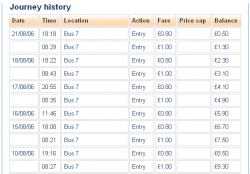Geo-locational applications are very interesting (yet scary) things. Seriously. Do you ever stop to think about how much we are being tracked and what that data is used for?
This seed of thought was planted last night when I started using the new Flickr map feature to add geo-locational data to my photos. Then this morning, I logged into my Oyster account to see if I was charged for topping up my pass at the tube station (despite the fact that I didn’t ride the tube). I found a lot more data there then I had bargained for. Obviously I knew that London transport had this information, but I really hadn’t thought about what this data could be used for.

In some cases this could come in handy – for example – during the London bombings it would have been easy for London Transport to know which bus I was on. They wouldn’t exactly know where I got off the bus, but they would know which bus and what time I entered (unless I paid cash) and make some assumptions based on that.
In other cases this can be used for bad things. My online stalker could easily figure out what bus routes I take and what time I am usually on them. Freaky.
Alongside this geo-locational data you have geo-marketing. Mining your geo-locational information to market to you in a smarter way. This type of information in invaluable to a retailer. They know when I leave my house, they know how long it takes for me to get to work, they know where I buy stuff (thanks to my handy debit card). The only trick is how to market to me effectively in a time-sensitive manner and in the correct location.
Obvious and quick win marketing vehicle – my mobile phone.
Yes, mobile operators have to get in on the game. So it isnt just when I get on the bus or when I make a purchase. They have to be able (albeit with my permission) to follow me every second that I have my phone on through gps technologies and then give me great offers based on that. Example: I am walking by Starbucks and I get an SMS telling me that I will get £1 off at Starbucks, handy dandy, I go in and buy a latte.
Why would I give my permission to Big Brother? I’m not that stupid.
It is the same thing as Verified by Visa*. You will be lead to believe that you are doing something to protect yourself.
Yes – I want to turn on the tracking system (fine print: we can use and sell your personal data) and the police will be able to find me in the event that I am kidnapped by some bad terrorist. All for free! Yipee! Thanks mobile phone company!
My lovely and dear friend Greg is the founder of a company that will mine data for just these purposes. Described as an intelligence company that uses real time and historical geospatial data to model and predict consumer behavior, company and sector performance.
Their model is a little bit different. It will be used to predict trends for markets and potentially help those tricky bankers make safer bets. However, you can imagine that in the hands of retailers this is just as powerful a system.
So how do I prevent my data from being used? And do I even care?
Honestly, I don’t like being tracked all the time (who would). But I’m not really sure what I can do by it. I am incentivised by Oyster to use the card by receiving pretty hefty discounts on my travel (£3 without Oyster / £1.50 with) and I use my debit card because I hate carrying cash all the time.
I suppose I am just stuck being followed and studied. I don’t do anything overly illegal so I’m not that worried, but it is slightly strange.
I guess this is the age that we live in. 🙁
* Yes, folks, Verified by Visa was only put in place to take the risk off of Visa and retailers by placing the risk in your own hands. Fantastic – now they don’t have to refund your fraudulent transactions if someone gets that password you set up. Doh!

